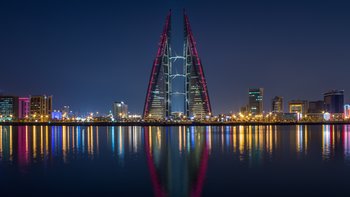COO Wes Schwalje's predictions on the politics, power, and policies that will shape the sector in the coming year
- New regulations will enhance personal data privacy, competition, e-commerce experiences
- e-Sports, social trading, travel tech, cloud kitchens and other innovative tech industries will take the limelight away from imploding high-profile firms
The last few years for the MENAP’s digital economy has been phenomenal. The next year is likely to be even better. Here are a few thoughts on what might unfold …
1. This Will be the Year of Personal Data Privacy: In 2015 there was the Dubizzle data breech, in 2017 the Zomato data breech affected the UAE, in 2018 Careem had a data breech – and likely many more occurred across the region which we don’t know about since most countries in the region don’t have data breech disclosure obligations and, in most cases, no personal data privacy laws at all. This will change in 2020 with several countries adopting data privacy laws. However, don’t get too excited – many of these laws will have broad exceptions and will be further clarified in subsequent laws and executive orders, such as cloud computing laws, that provide data access and assert data sovereignty and localization requirements.
2. An Autonomous Taxi Service Will be Launched:
Next year will see the launch of the region’s first robotaxi services.
Waymo is running a driverless taxi service in California and Arizona in the United States. If they can do it why can’t we? Rather than a US tech company launching it in our region, it will likely be a Chinese company, like Didi, or a bi-national company, like AutoX or Pony.ai, that is first to market. We will also see regulations for autonomous delivery vehicles and trucks passed by a MENAP country. Perhaps Pakistan.
3. Another Big Ridesharing Player (or players) Will Enter the MENAP Market in Q1: It is unclear if Bolt, Didi, or Ola will strike first, but they will come, and they will double down on expansion. Yandex is also likely to eye entering Egypt. Or will of Meituan Dianping, Didi, or Go-Jek establish a foot hold in the delivery space to gradually move into ridesharing? Similar to global pressures, there will be an increasing emphasis on sustainable business models which are cost-efficient and may not bode well for incumbents.
4. Online Retailers to Become More Liable for Third-party Seller Products: The digital economy across the region is becoming too big to ignore consumer rights and product liability laws.
As online retail grows, this year will see a regulatory precedent set, likely by a GCC country, enabling consumers to assert product liability claims directly against online third-party vendor platforms which exert substantial control over vendors.
5. The Rise of Competition Authorities: With the disruption of several offline legacy industries and high profile M&A deals in the tech sector, emerging competition and antitrust agencies in the MENA are going to take a much stronger look at abuse of dominant position cases in the technology sector and other offline industries like pharmaceuticals and telecom.
6. Several Arab Countries Will Open Coding Schools Using Income Sharing Agreements: 42 is in Morocco, Algeria, and Tunisia, and Lamda School is rumored to be eyeing the market. A crop of home-grown coding schools have also emerged. Income sharing agreements are potentially a very innovative way for Arab countries to bargain market access for upskilling their technology workforces – an active labor market program 2.0 strategy to launch coding schools and share the costs of upskilling youth is an interesting twist on the old-school national training fund approach.
7. Integration of the Entrepreneurship Ecosystems in Africa, Pakistan, India, Bangladesh, and China With the MENA: We will see more integration between these once disparate entrepreneurship ecosystem in terms of companies looking at opportunities across these frontier regions, companies setting up shop in the MENA, and investors from all of these regions becoming more adventurous in the deals they look at.
8. Public Investment Fund and Mubadala Will Have Lower Participation in Vision Fund II:
This is the land of visions, so why not have a regional vision fund?
We will see Mubadala and the Public Investment Fund make significant efforts to build internal capabilities to scale up investments in the world's biggest tech firms while maintain more control over investment decisions. How about a regional vision fund which would broaden exit opportunities for regional startups by attracting global tech companies to set up in the region.
9. Venture Investors Will Become More Adventurous in Search of Value: Chinese investors are already increasingly active in Africa, and we will likely see the MENA’s VCs start looking at deals in Pakistan, India, Bangladesh, Nigeria, Kenya, Arab countries like Iraq, and many frontier markets in between, which are producing some great startups at favorable valuations.
10. Cloud Kitchens Will Boom: It’s going to be a big year for cloud kitchens in the region. We will likely see the market entry of competitors from India, like Swiggy, or China in the GCC. Swiggy, similar to Zomato which sold its UAE business to Delivery Hero, has been innovating in the cloud kitchen space in India and likely to make a bet on lucrative delivery market in the GCC like the UAE and Kuwait. Could we see the entry of Meituan Dianping, Didi, or Go-Jek enter the market with a longer term view to move into ridesharing?
11. The Implosion of Several High Profile MENA Start-ups: There are several hot media, real estate, and direct-to-consumer startups in the region which perhaps are stretching the definition of a “technology company” while providing little evidence they are one.
Does simply using technology to sell your product make you a tech company?
12. Intensifying Competition in Homesharing and Experiential Travel: With Expo 2020 and World Cup 2022 bringing the world to the region’s door, there is going to be a land grab in the homesharing space (think Oyo) and experiential tourism space (think Klook and Getyourguide). These are also likely to be hot spaces for regional startups to target.
13. The Rise of the Baltic and Nordic Countries as Tech Development Benchmarks: E-Estonia is the ultimate benchmark for how citizens should engage with government and a model for technology-driven development in the region. Estonia has also become a startup powerhouse producing unicorns like Bolt, TransferWise, and Skype. Nordic incubated concepts like Mobility as a Service will also be increasingly influential in the region and perhaps will push an Arab country create a Ministry of Smart Mobility to oversee emerging regulations for mobility technologies related to autonomous passenger and freight transport, electric vehicles, drones, commercial tunneling, and high-speed trains.
14. G20 and Expo 2020 Will Mend Regional Ties: Event and summit diplomacy will play a mediating role in regional tensions in 2020. Realpolitik is likely to prevail as several of the simmering regional disputes may cool down with the world’s attention and cancel culture’s cross hairs trained on the region.
15. Regional Competition for Africa to Increase Startup Ecosystem Cooperation: Africa has 50% of the top 20 fastest-growing economies and the youngest population in the world.
However, very few MENA startups consider Africa in scaling plans despite the opportunities, while African startups still view the MENAP as s source of moneybags.
These perceptions are starting to change with a number of emerging investment summits that are linking the investment and entrepreneurship ecosystems and the increasingly strong role Egypt is playing in removing trade and investment barriers through the African Continental Free Trade Agreement.
16. The Rise of Social Trading: The MENA needs its Robinhood, a commission free trading app popular among millennials looking to start investing in the US. The average age of Robinhood users is 28-41, and most of them use the app to make their first stock purchase. The MENAP needs its Robinhood to kick off a new wave of financial literacy that disrupts the region’s brokerage industry, lowers transaction fees, and provides more liquidity in regional stock markets through increased integration.
17. E-sports are the Next Big Thing: E-sports are going to become big in the MENAP with a strong ecosystem emerging around the sector.
















































